ICASSP 2023 Conference Travel to Rhodes Island
A Journey into Cutting-Edge Signal Processing and Inspiring Discussions
I am thrilled to share my experience attending the International Conference on Acoustics, Speech, and Signal Processing (ICASSP) 2023 in Rhodes Island, Greece. This flagship conference brought together more than 4000 registrants and showcased 2765 accepted papers out of 6127 submissions. From thought-provoking technical sessions and uniquely organized poster presentations to inspiring plenary talks and engaging panel discussions, ICASSP 2023 offered an exceptional platform to explore the latest advancements in signal processing. As a PhD student, this conference provided an incredible platform for me to present my research paper, engage with fellow researchers, and explore the latest advancements in my field. In this blog post, I will take you through the highlights of the conference and the valuable insights gained during my time there.
The conference began with the welcome reception, setting the stage for an exciting week ahead. I presented my paper, Distributed Signal Processing for Out-of-System Interference Suppression in Cell-Free Massive MIMO, which I co-authored with my supervisor, Prof. Erik Larsson. In the paper, we proposed a novel phase-rotate-and-average algorithm that exploits the fact that interference is the same at all access-points to mitigate the out-of-system interference in a sequentially connected cell-free massive MIMO system. You can find more details of the paper here or open-access here.

Technical Sessions and Poster Presentations
The technical sessions were thoughtfully organized and covered a wide range of topics, including speech processing, signal analysis, and audio coding. Renowned researchers delivered presentations on cutting-edge research, pushing the boundaries of knowledge in our field. These sessions not only provided a platform for researchers to share their work but also fostered insightful discussions and collaborations.
One unique feature of the conference was the poster presentation area, which was located beside the pool in a beautiful greenhouse setting. This arrangement created a relaxed and inviting atmosphere, encouraging attendees to interact and engage with the presenters. It was an excellent opportunity to learn about exciting ongoing projects and exchange ideas with fellow researchers. The vibrant discussions during the poster sessions added an extra dimension to the conference experience.
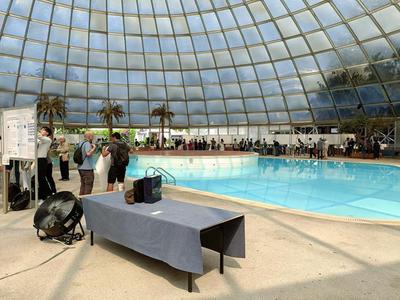
Industrial Expos
ICASSP 2023 showcased a multitude of industrial expos, where leading companies presented their latest technologies and products related to acoustics, speech, and signal processing. These expos allowed researchers to explore practical applications of their work and facilitated connections between academia and industry. Witnessing the advancements and innovations being made in real-world applications was both inspiring and informative. There was also job fair for young researchers. Got an META cap.
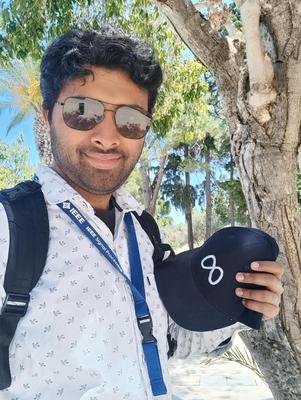
Workshops & Tutorials
I had the opportunity to attend a fascinating workshop conducted by MathWorks on Machine Learning. The workshop provided valuable insights into the latest advancements and applications in this rapidly evolving field.
In addition, I participated in a tutorial on Signal Processing for 6G Near Field Communications led by Prof. Yonina Eldar, Prof. Linglong Dai, and Doctoral students Haiyang Zhang. The tutorial explored various aspects, including the derivation of Rayleigh distance in near-field communications and the distinction between beamfocusing and beamforming. I also gained knowledge about the modeling of near field path loss using non-linear functions and spherical waves, as well as the challenges involved in beam split and near field channel estimation. These sessions greatly expanded my understanding of the subject matter.
I also had the opportunity to attend a tutorial titled Information Theory meets Deep Learning led by Prof. Jose Principe, Prof. Robert Jenssen, and Prof. Shujian Yu. The tutorial delved into the history and recent resurgence of Information-Theoretic Learning (ITL) in the context of deep learning. It covered topics such as the fundamental quantities of information theory (entropy, mutual information, divergence) and their estimation, the principles of Information-Theoretic Learning, leveraging information theory to advance deep learning problems, the theory and application of the Information Bottleneck method, and finally, the challenges and open research directions in this field.
Panel Discussions
I attended a panel discussion: Past present and future of the signal processing with panelists: Prof. Alex Acero, Prof. K.J. Ray Liu, Prof. Ali H. Sayed, Prof. Rabab K. Ward and moderator Prof. José M.F. Moura. The primary focus of the discussion revolved around the question of whether signal processing has reached saturation or if machine learning will eventually surpass it. Among the various arguments presented, Prof. Ali Sayed made intriguing remarks. Firstly, he highlighted that adaptive signal processing had long ago incorporated data-driven stochastic gradient methods, which are now widely used in the machine learning community. He also emphasized that the pioneering work on backpropagation was conducted as early as the 1970s, and these methods have significantly influenced the current landscape of machine learning.
In addressing why machine learning has gained more traction than signal processing, Prof. Sayed put forward two key points. Firstly, he noted that signal processing has become so proficient at what it does that its advancements are often hidden within everyday devices, such as mobile phones that seamlessly perform tasks like noise cancellation, digital signal processing, speech/audio/video processing, and wireless signal processing. Consequently, ordinary users are not aware of the complex underlying processing happening within these sophisticated devices. Secondly, he acknowledged that while the machine learning community also engages in data processing, they have been effective in marketing their outcomes using terms like “machine learning” or “artificial intelligence,” which have garnered significant attention.
On the topic of emerging challenges in signal processing was discussed, particularly in relation to the evolving landscape of social media networks, graphs, and multi-agent devices. The speaker emphasized the need for new signal processing techniques to address the novel types of “signals” that will emerge in these domains. Additionally, he highlighted the importance of the signal processing society in adding a sense of understanding to artificial intelligence (AI), which he referred to as counter AI. He expressed concerns that without a deeper understanding of why machine learning algorithms work or fail, there could be a potential collapse of applications relying on such algorithms in the future. To illustrate this point, Professor Chandra suggested watching the movie Idiocracy (2006) during the banquet, drawing parallels to the argument put forward by Professor Ali Sayed.
Overall the speakers emphasized the signal processing community’s role in adding understanding and sense to artificial intelligence, as the wider community’s lack of comprehension regarding the inner workings and limitations of machine learning could lead to potential issues. The suggestion to watch Idiocracy during the banquet served as a thought-provoking illustration of the potential consequences if the advancements in AI are not accompanied by a deeper understanding and collaborative efforts from disciplines like signal processing.
Enriching Plenary Talks
The plenary talks were a major highlight of the conference. Prof. Andrew Goldsmith delivered an insightful talk titled Disrupting NextG, emphasizing the importance of domain-specific knowledge combined with machine learning for significant improvements. Prof. Richard G. Baraniuk captivated the audience with his talk on the local geometry of deep learning, shedding light on the inner workings of these complex models. Another captivating presentation was by Prof. Christos Harilaos Papadimitriou on How does the brain create language, providing fascinating insights into the intersection of neuroscience and signal processing.
Cultural Experiences
The conference organizers went above and beyond in ensuring a memorable experience for the attendees by organizing a range of exciting events alongside the conference itself. One of the highlights was an open-air fair featuring a diverse array of vendors offering local handicrafts, artwork, and delicious food from the region. Attendees had the opportunity to explore the vibrant stalls, sample the culinary delights, and immerse themselves in the local culture. Additionally, a spectacular musical concert took place, showcasing talented musicians who performed a mix of traditional Greek melodies and contemporary tunes, creating an electrifying atmosphere that had everyone dancing and singing along.
During the conference, a well-organized banquet was arranged, complete with traditional Greek dances and music. The attendees were treated to a sumptuous feast while being entertained by captivating performances that captured the essence of Greek heritage and traditions. This cultural immersion provided a unique and enriching experience, fostering a sense of camaraderie and celebration among the conference participants.
Moreover, the organizers demonstrated thoughtfulness by making local public bus transport free for all conference attendees. This initiative not only eliminated the hassle of purchasing tickets but also offered an opportunity to explore the city and its surroundings without any concerns about transportation logistics. With the freedom to hop on and off the buses at their convenience, attendees were able to discover the city’s hidden gems and soak in its charm during their stay.
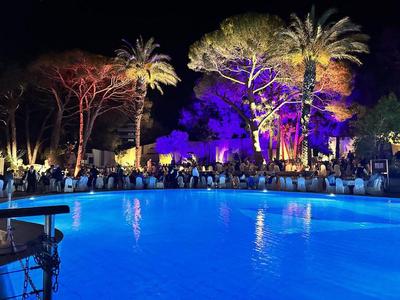


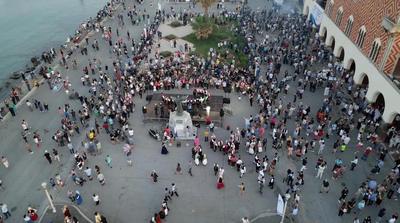

Memorable Moments
Attending the conference proved to be an enriching experience as I had the privilege of meeting renowned professors such as Prof. Oppenheim, Prof. Ali Sayed, Prof. Andrew Goldsmith and Prof. Yonina Eldar. What made it even more special was the opportunity to receive a giveaway book from Springer (Publisher) titled “Adaptive Filtering,” and to my surprise, the author of the book, Prof. Paulo Diniz, was also present at the conference, allowing me to get an author-signed copy. The conference also offered a generous 30% discount on Cambridge books, and I couldn’t resist purchasing three books (Inference and Learning from Data by Prof. Ali H. Sayed) to add to my collection. It was a moment worth capturing, so I took a memorable photo with these esteemed academics to cherish the experience in the years to come.
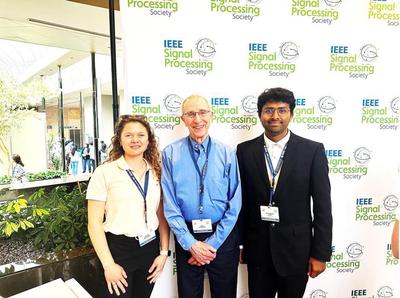
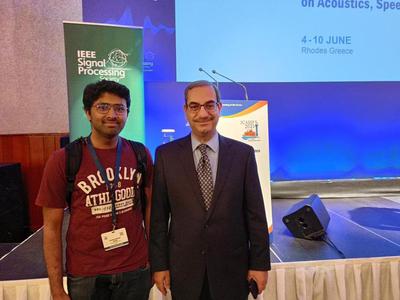
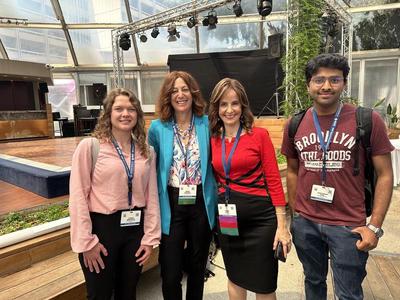
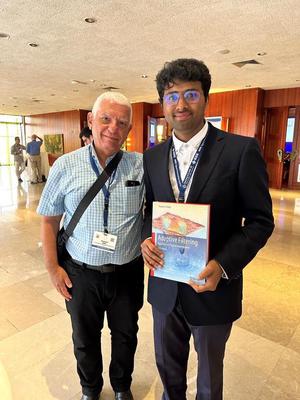
I would like to extend my heartfelt gratitude to my supervisor Prof. Erik Larsson for providing me with the invaluable opportunity to attend the conference. It was an enriching experience that broadened my knowledge, expanded my network, and will undoubtedly contribute to my professional growth.
A few Beach and Other Photos







